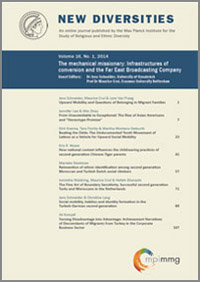Banal, Benign or Pernicious? Religion and National Identity from the Perspective of Religious Minorities in Greece
by Effie Fokas (Hellenic Foundation for European and Foreign Policy, ELIAMEP and Hellenic Observatory, LSE)
To cite this article: Fokas, E. (2015). Banal, Benign or Pernicious? Religion and National Identity from the Perspective of Religious Minorities in Greece. New Diversities, 17(1), 47–62. https://doi.org/10.58002/g3gr-qq77
Intersections between religion and law are increasingly permeating the public sphere. From burqa bans to same-sex marriage, a strong relationship between religion and national identity (whether ‘negative’, as in the French case, or ‘positive’ as in the Greek case), can often be found as a central factor therein. Based on empirical research conducted on pluralism and religious freedom in Greece and other majority Orthodox countries, this article seeks to locate the religion-national identity link within the grey area at the intersection between religion and law. The voices of religious minority groups illustrate the blurred lines between the benign and the pernicious in banal manifestations of the religion-national identity link in the Greek context. Against the backdrop of the Greek example, the article then navigates through normative debates about whether and how limitations to the freedoms of religious minorities, in cases where these limitations are linked to the relationship between religion and national identity, can be effectively redressed.
Keywords: Orthodoxy, church-state relations, religious education, proselytism, equality
|
